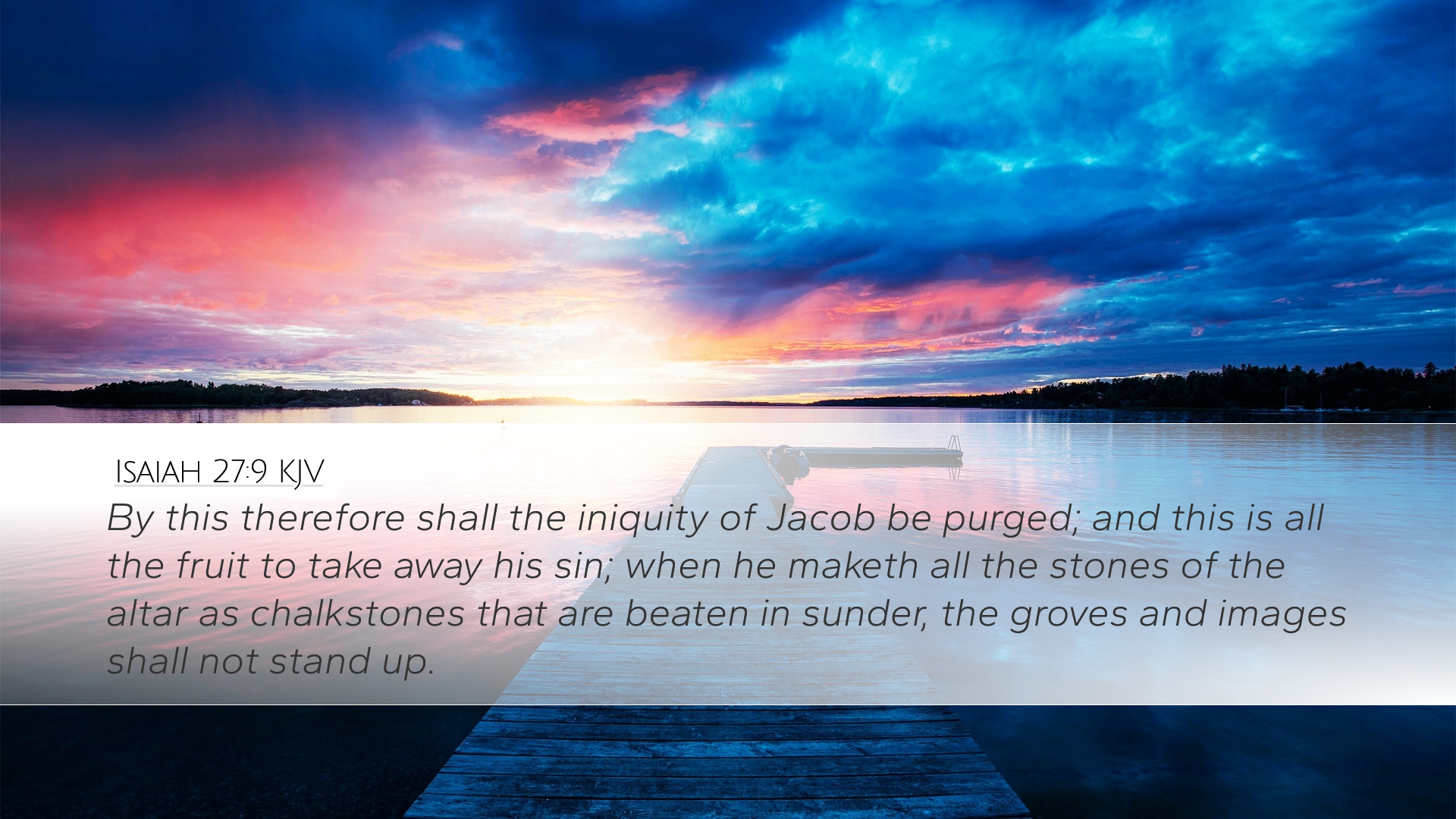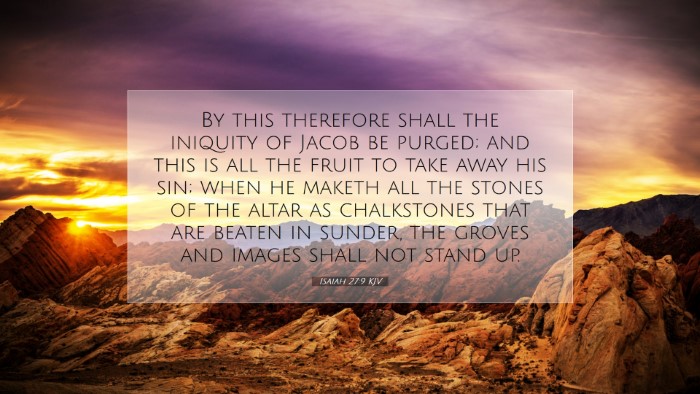Isaiah 27:9 Commentary
Verse: "By this therefore shall the iniquity of Jacob be purged; and this is all the fruit to take away his sin: when he maketh all the stones of the altar as chalkstones that are beaten in sunder, the groves and images shall not stand up." (Isaiah 27:9)
Introduction
This verse is situated within a profound section of Isaiah where the themes of judgment and redemption intertwine. The message conveyed here speaks to the purging of sin and the removal of idolatrous practices. Notably, this verse serves as a crucial theological foundation for understanding God’s corrective hand upon His people, Israel.
Contextual Background
Isaiah prophesied during a tumultuous time in Israel’s history, as the nation faced both external threats and internal corruption. The context of Isaiah 27 reflects the ultimate restoration and vindication of Israel post-exile. Here, the text addresses the significance of divine purging in achieving holiness among the people.
Theological Insights
- Divine Purging of Iniquity: Matthew Henry emphasizes that the iniquity of Jacob can only be purged through divine intervention. This purification is not merely external but speaks to a transformative process that God initiates in the hearts of His people.
- Symbolism of the Altar: Adam Clarke highlights the metaphorical imagery of the ‘stones of the altar’ being reduced to chalkstones. This act signifies the dismantling of false worship and the erasure of idolatry that had infiltrated Israelite society.
- Judgment as a Path to Restoration: Albert Barnes asserts that God’s judgment serves a dual purpose—it confronts sin while simultaneously preparing a way for restoration. The purging of sin should lead to a renewed commitment to worship and follow the true God.
- Hope Amidst Judgment: Despite the stern warning regarding sin, there exists an underlying current of hope emphasizing that God will cleanse and restore. The process of purging also signifies that every act of divine judgment is ultimately aimed at redemption.
Insights from Matthew Henry
Matthew Henry illuminates the passage by illustrating the importance of repentance in the purging process. He notes that the purging occurs through a sincere acknowledgment of iniquity—a theme that resonates throughout Scripture. Through divine correction, the hearts of the people are brought back into alignment with God’s will.
Insights from Albert Barnes
Albert Barnes delves into the characteristics of the ‘groves and images’ referenced in this text. He remarks that the references to these elements underscore the pervasive nature of idolatry at the time, signifying the need for thorough eradication of all false worship practices. Barnes asserts that God desires His people to be wholly devoted to Him, free from any influence that detracts from His glory.
Insights from Adam Clarke
Clarke provides a rich historical perspective on this text, focusing on the practical dimensions of worship and idolatry in ancient Israel. He articulates that the ‘beaten stones of the altar’ symbolize the dismantling of corrupted worship systems as part of the purging process. Clarke also expresses that this purging should lead to genuine worship, moving away from the superficial practices that had grown prevalent.
Implications for Modern Readers
In interpreting Isaiah 27:9, modern readers—especially pastors, students, and theologians—are confronted with the continued relevance of upcoming judgment and the need for purification of sin. This text invites reflection on the obstacles that inhibit true worship today, urging believers to evaluate their lives against the standard of God's holiness.
- Identifying Idols: Readers are encouraged to identify modern-day idols that crowd out genuine worship of God. This could include materialism, personal ambition, or even religious traditions that distract from the core message of the gospel.
- Embracing Purification: The call to repentance is profound, encouraging believers to pursue purity actively. This includes engaging in community accountability and fostering an environment where confession and accountability are practiced.
- Hope for Restoration: Ultimately, the message of hope contained within this verse reminds believers that no matter how deep one's iniquity may run, God offers redemption and the chance for a restored relationship with Him.
Conclusion
Isaiah 27:9 stands as a testament to God’s unwavering pursuit of His people, revealing the intricate balance between judgment and mercy. As the iniquity of Jacob is purged, a powerful reminder of God’s sanctifying work emerges. Through overcoming sin and restoring worship, this text not only speaks to ancient Israel's context but also extends a timeless invitation for all believers to seek holiness and true devotion.


